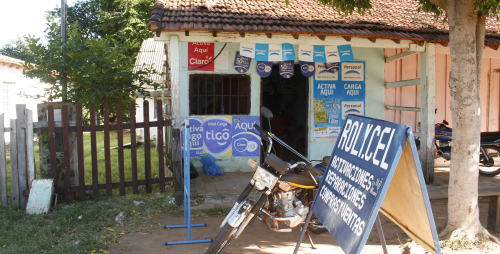The opportunity to increase financial access in Paraguay is massive. Paraguay has one of the lowest rates of banking penetration in Latin America: only 22% of adults in Paraguay have an account at a formal financial institution, on par with banking penetration rates in Haiti and Guatemala (World Bank Global Findex 2011).
 Fortunately, policymakers and regulators in Paraguay are committed to the dual goals of financial stability and inclusion, and are taking important steps to realize the opportunity. The Central Bank of Paraguay and the Superintendence of Banks have embarked on the development of a National Strategy for Financial Inclusion, together with the World Bank. Additionally, the Central Bank of Paraguay has recently issued new regulation that seeks to formalize the role of mobile operators as e-money issuers.
Fortunately, policymakers and regulators in Paraguay are committed to the dual goals of financial stability and inclusion, and are taking important steps to realize the opportunity. The Central Bank of Paraguay and the Superintendence of Banks have embarked on the development of a National Strategy for Financial Inclusion, together with the World Bank. Additionally, the Central Bank of Paraguay has recently issued new regulation that seeks to formalize the role of mobile operators as e-money issuers.
Anecdotal evidence, commercial lessons, and international regulatory principles all speak in favour of opening the market to providers with different value propositions and business models. Best practices are well established at both the regulatory and commercial level to guarantee the soundness of mobile money schemes and contribute to the integrity and stability of the financial system.
Under Resolution 6 issued in March 2014, mobile operators in Paraguay can become licensed e-money issuers, or Entidades de Medios de Pagos Electrónicos (EMPEs). As per international best practices, EMPEs are subject to measures to safeguard customer funds. Licensees must set up a trust account equal in value to the amount of money issued electronically, and are not allowed to intermediate funds. Moreover, all transactions must be online, in real-time, and maximum caps are set on mobile money account balances.
The Paraguayan regulation also includes highly unique provisions that have not been previously tested in other markets. Most notably, balances on accounts that have been inactive for 90-days or more must be automatically transferred to a savings account at a formal financial institution. If the mobile money account holder does not already have a bank account, the EMPE must facilitate seamless account opening for that customer at a partner bank. Account-to-account interoperability between mobile wallets and bank accounts will be necessary to fully enable this provision. In fact, the regulation mandates interoperability, though it leaves open the commercial and technical specifications for the industry to define.
While it is much too early to assess the merits of this uniquely Paraguayan approach in its totality, the clear take-away is that regulators have taken a critical step by creating a framework for e-money issuers. Mobile money has the potential to bridge the financial access gap in Paraguay, and provide invaluable services to segments of the population excluded from the formal financial system.
Mobile money services in Paraguay have already multiplied ten-fold the number of retail touch points with the financial system. Personal and Tigo are leading the charge with Billetera Personal and Tigo Money, respectively. Beyond providing the ability to process remittances, these services also offer customers the ability to control their financial lives better, and increase their access to formal financial services. For example, loan disbursement and collection is facilitated through mobile money, without a client needing to walk into a bank branch.
We are eager to monitor industry developments and report on enhanced mobile financial services offerings in this market.